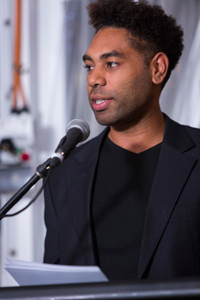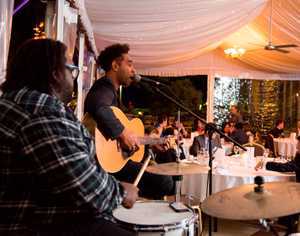Griffith University

Marcus Corowa, musician, singer and songwriter
Last month, Griffith Asia Institute invited one of Australia’s emerging artists: musician, singer and songwriter Marcus Corowa, to launch the Roundtable on Soft Power and Public Diplomacy in the Indo-Pacific.
Asking a musician to open an academic dialogue steps a little outside the bounds of the usual. But alongside GAI, key dialogue partners: the Department of Foreign Affairs and Trade (DFAT) and the Korea Foundation were keen to curate a dialogue that was as much an exercise in public diplomacy as it was about public diplomacy. Bringing diversity of practice and thought to the fore, including through the voice and performance of artists, was therefore essential.
 Marcus is no stranger to public diplomacy. As the 2015 recipient of the British Council Australia’s ACCELERATE program, he is aware of the contemporary significance nations attach to promoting and projecting identity and influence in the world, especially through culture. In addition to this, a performer of Aboriginal and South Sea Islander descent, Marcus brings a striking ability to reflect on the timeless perspective of his craft.
Marcus is no stranger to public diplomacy. As the 2015 recipient of the British Council Australia’s ACCELERATE program, he is aware of the contemporary significance nations attach to promoting and projecting identity and influence in the world, especially through culture. In addition to this, a performer of Aboriginal and South Sea Islander descent, Marcus brings a striking ability to reflect on the timeless perspective of his craft.
It became clear as Marcus spoke to us that the stories of place and people through time – our folksonomy – reflect an embedded cultural identity that has diplomatic value. These are the stories that convey our communal aspirations, offer guidance, encode and preserve knowledge to be passed on from generation to generation.
The telling of these stories is the craft of public diplomacy. It is a craft, Marcus reminded us, that Australia’s Indigenous peoples have mastered from the time of creation or Dreaming through to today.
Story-telling rarely features in academic texts or foreign policy discussions on power and diplomacy. Too often it is dismissed, marginalised or overlooked – alongside broader concepts of cultural diplomacy – as nice, but not essential. Indeed cultural diplomacy has limited impact in the face of harder geopolitical issues or crises. At the same time, increasing pressure for economic returns and budget efficiency blinkers policy-makers to the intrinsic, long-term social value of the story-telling craft.
Yet stories are deeply embedded within the diverse cultural contexts of the Indo-Pacific. They inform behaviours and interactions, not just between individuals but importantly between peoples and societies. They are a soft power resource. Through their telling they can enable understanding and empathy and generate influence.
Policy-makers and diplomats are at risk of losing the deeper connections between story-telling, public diplomacy and soft power that can support the negotiation of national and regional interests over the long term.
The words Marcus shared with us about the deep significance of his craft are too striking to be lost in the aftermath of the event. They are especially poignant right now as Australia’s cultural community is once again faced with political marginalization and funding crisis. An excerpt of Marcus’ speech is reproduced here with his permission:
There is an Aboriginal proverb that says Those who lose dreaming are lost.
Another says: We are all visitors to this time, this place. We are just passing through. Our purpose here is to observe, to learn, to grow, to love…and then we return home.
From the dreaming to this moment and until we return home, music plays a significant role in our lives. From the moment we are born, we are cradled in our mothers arms, we hear them singing; singing us to sleep.
Go to sleep my little pikinini, the flying fox will get you if you don’t.Go to sleep my little pikinini, the flying fox will get you if you don’t.
My Grandma would sing this to us kids, and us kids would try and get to sleep as fast as we could because we didn’t want no flying fox to get us.
 Music to me in some ways is a form of exchange. When someone is singing or playing you a song they are willingly expressing something of themselves for you to receive; making you feel and influencing your experience and perspective in life.
Music to me in some ways is a form of exchange. When someone is singing or playing you a song they are willingly expressing something of themselves for you to receive; making you feel and influencing your experience and perspective in life.
Songs are like the bloodline within a culture, and contain specific details about the way of life. There are songs about the dreaming, about stars, traditional law, about seasons, and all the animals.
Traditionally, songs can be used for welcoming. They can be used for blessing and also for cursing. The song that I sang to you was a blessing song. It is a good luck song from the Bundjalung nation, the nation of my ancestors.
Songs were also used to navigate the land when traveling long distances. These were known as Songlines. The melodies and rhythms of the songs were as equally important as the words of the songs. The music of the songs was used as maps to guide people to their destination, sometimes hundreds of kilometers away. Songs have a very strong connection to the land. When songs are sung it keeps the land strong. Music is the link that connects us to knowledge, wisdom and the messages that were taught 40,000 years ago.
But now a lot of those songs are lost, and with the songs, a lot of knowledge has also disappeared. What is now left, are remnants of once was and it’s vital that we hold on to what has been passed down from generation to generation. It’s important to continually cultivate an environment to help keep culture alive.
Culture through music and the arts play a vital role in the preservation, promotion and sharing of culture. This can be seen thorough the Indigenous and cultural festivals we have around the country. Through these events we can see the practice of culture through songs, dance and the arts. It is often one of the only places where Indigenous culture can be accessible and shared with the wider community.
As artists, musicians, songwriters we reflect the times through our gifts and talents and it is important for our voices to be heard.
Article by Dr Caitlin Byrne, Assistant Professor, Faculty of Society and Design, Bond University and Marcus Corowa, musician, singer and songwriter.
No comments:
Post a Comment